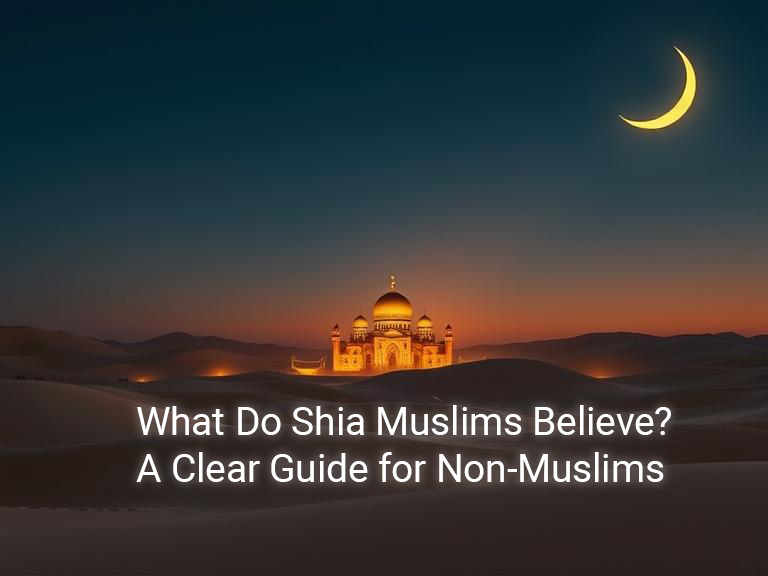An easy-to-understand guide to Shia Muslim beliefs, values, and spiritual views written for non Muslims seeking clarity and understanding.
Introduction: Building Bridges Through Understanding
Islam, one of the world’s major religions, is practiced by over a billion people across the globe. While Muslims share core beliefs, there is rich diversity within the faith. One of the two main branches of Islam is Shia Islam.
For those unfamiliar with Islamic teachings, the terms and differences may seem confusing. This article aims to provide a simple, respectful, and informative guide to what Shia Muslims believe. It is written especially for non Muslims or anyone new to the topic.
Rather than focusing on rituals or political history, we will explore the spiritual and ethical worldview of Shia Muslims their belief in God, the role of the Prophet and his family, divine justice, and the importance of living a meaningful, morally grounded life.
Let’s take a closer look at the key beliefs that shape the Shia Muslim understanding of faith and life.
Belief in One God: The Foundation of Everything (Tawheed)
At the heart of Shia Islam is Tawheed, the belief in the absolute oneness of God. Shia Muslims believe that there is only one God (Allah) who is eternal, all-powerful, merciful, and just.
This concept of monotheism is similar to the belief in one God found in Christianity and Judaism. However, in Islam, God is not seen in human form or as part of a trinity. Instead, Allah is beyond human attributes and completely unique.
Shia Muslims emphasize that God is both just and compassionate, rewarding good and holding people accountable for their choices. This understanding shapes a personal relationship with God based on love, trust, and moral responsibility.
Prophets, Revelation, and Divine Messages
Shia Muslims believe that throughout history, God sent prophets to guide humanity. These include well-known figures such as Adam, Noah, Abraham, Moses, and Jesus.
The final prophet in Islam is Prophet Muhammad (peace be upon him), who received the Quran, the last and complete revelation of God’s message.
While Shia Muslims respect all prophets, they see the life and message of Prophet Muhammad (PBUH) as the culmination of divine guidance. His teachings form the foundation of Islamic beliefs and ethics.
The Special Role of the Prophet’s Family (Ahl al-Bayt)
One of the defining aspects of Shia Islam is the deep reverence for the Ahl al-Bayt, the family of the Prophet Muhammad (PBUH).
This includes his daughter Fatima (peace be upon her), his cousin and son-in-law Imam Ali (peace be upon him), and their sons Imam Hassan and Imam Hussain (peace be upon them), among others.
Shia Muslims believe that the Ahl al-Bayt are not only spiritually pure but also chosen by God to lead the Muslim community after the Prophet. Their lives are seen as models of truth, sacrifice, and moral integrity.
Imam Hussain’s stand at Karbala is especially remembered as a symbol of standing for justice and truth, even in the face of oppression.
Leadership Through Divine Guidance (Imamate)
In Shia Islam, leadership of the Muslim community after the Prophet is not just a political matter but a divine responsibility. This is known as Imamate.
An Imam in the Shia context is not simply a prayer leader. Instead, an Imam is a spiritual and moral guide appointed by God to continue the Prophet’s mission.
Shia Muslims believe that there are twelve Imams, starting with Imam Ali (a.s) and ending with the awaited Imam Mahdi (a.s), who is believed to be in occultation and will return one day to establish justice.
The concept of Imamate emphasizes the importance of divinely guided leadership, based on wisdom, compassion, and justice.
Justice and Free Will: A Moral Worldview
Justice (Adl) is a central belief in Shia Islam. Shia Muslims believe that God is always just, never punishing unfairly or acting without reason.
At the same time, humans are given free will. Each person is responsible for their choices and will be held accountable in the hereafter.
This belief encourages a strong sense of personal ethics. For example, choosing to tell the truth even when it is difficult, or helping someone in need without expecting anything in return, are seen as moral actions rooted in faith.
Suffering and hardship are not punishments but tests, and enduring them with patience is considered a virtue.
Life After Death and the Purpose of This Life
Shia Muslims believe in life after death, resurrection, and a Day of Judgment, when all individuals will be held accountable for their actions.
This belief gives purpose to life: it is not just about material success, but about spiritual growth, ethical behavior, and striving to please God.
Doing good, avoiding harm, helping others, and living a life of integrity are seen as ways to prepare for the life to come.
Common Misconceptions and Clarifications
Let’s address some common misunderstandings about Shia Islam:
- Do Shia Muslims worship Imams?
No. Shia Muslims worship only Allah. Imams are respected as guides, not as divine beings. - Are Shia beliefs different from those of other Muslims?
The core beliefs, belief in one God, the Prophet Muhammad, the Quran, and the Day of Judgment, are the same. The main difference is in understanding leadership after the Prophet. - Is Shia Islam a separate religion?
No. Shia Islam is a branch of mainstream Islam, not a different religion.
Values That Shape Daily Life
The Shia worldview promotes a set of values that guide daily life:
- Loyalty to Truth — speaking the truth and standing up for it, even when difficult.
- Justice — inspired by the stand of Imam Hussain (a.s) against injustice.
- Service to Others — helping the needy, feeding the poor, and supporting the oppressed.
- Humility and Patience — enduring hardship with grace and placing trust in God.
- Knowledge and Reasoning — using intellect to understand faith and life.
These values are lived out through family, community, and individual choices.


